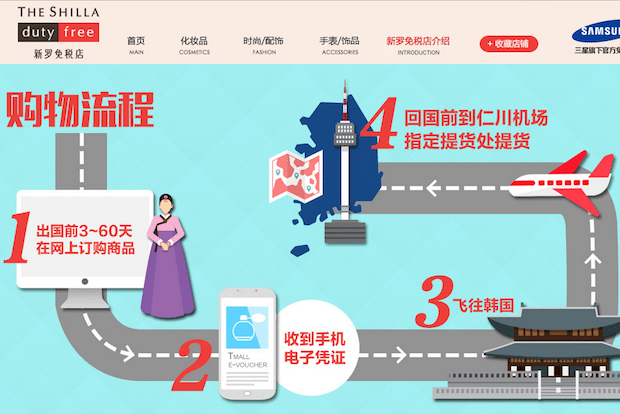
While Alibaba’s anticipated flood of international luxury fashion brands flocking to Tmall has been more of a trickle in recent years, the Chinese e-commerce behemoth and its competitor JD.com may make more headway in getting high-end brands on their platforms in another way—through international department stores and duty-free giants.
This week, JD.com announced that it’s teaming up with major South Korean retailer Lotte, which will sell fashion and beauty products on the JD Worldwide platform through the site's "Korean Mall." The announcement comes not long after Alibaba revealed earlier this month that it will be teaming up with South Korean duty-free retailer Shilla as well as Thailand’s King Power duty-free shops to allow users to reserve goods online before they travel so they can quickly pick them up in-store when abroad.
It's not just Asian retailers getting in on the market. Macy’s announced earlier this month that it was opening an official shop on Tmall in a joint venture with Hong Kong’s Fung Retailing Limited. The department store’s launch follows both Alibaba and JD.com’s creation of global platforms. Alibaba’s edition, Tmall Global, features 11 country “pavilions” that were announced in June this year, featuring brands and travel information for the United States, New Zealand, Australia, Switzerland, France, Britain, Spain, Singapore, Thailand, Malaysia, and Turkey. Meanwhile, JD.com launched its similar JD Worldwide platform in April. These platforms take advantage of a growing number of government-approved bonded warehouse zones that have sprung up in Shanghai, Zhengzhou, Ningbo, Hangzhou, Chongqing, and Guangzhou, which allow for faster international shipping times and lower fees.
The growing interest of department stores and duty-free retailers in Tmall and JD.com could be a useful outlet for the e-commerce companies to continue their march toward "premiumization" and feature legitimate outlets to purchase brands that don't have their own shops on the sites. Although Alibaba has been able to secure official shops by Burberry, Calvin Klein, and Lacoste, most fashion brands have shied away from both Tmall and JD.com in fear of the mass-market association.
In addition to international department stores, international retailers selling “mass premium” goods like cosmetics, sunglasses, and imported food have warmed much more quickly to the platforms. This week, Alibaba announced that German retail giant Metro has launched a Tmall Global shop, where it’s selling premium foreign imports including European chocolate, coffee, milk, and honey. A massive number of foreign beauty brands have already opened up shop on Tmall and/or JD.com, including top names like L’Occitane, Shiseido, The Body Shop, and Lancôme. In addition, JD.com scored a major win when it signed Sephora, announcing in the same week that eyewear retailer Luxottica was opening up shop as well.
Competition is fierce between Alibaba and JD.com to snag global retailers, and both companies are luring brands with a variety of methods including offers of special services, promises to do more to keep gray-market goods off the site, and greater benefits for signing exclusive contracts that prevent brands from setting up shop on the competitor’s site.